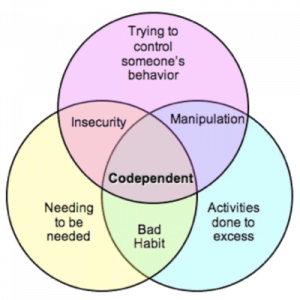What is codependency?
 Codependency can be defined as a condition that affects people in such a way that they enable a person close to them to commit abuse by aiding and protecting that person.
Codependency can be defined as a condition that affects people in such a way that they enable a person close to them to commit abuse by aiding and protecting that person.
Many signs of codependency seem like normal behaviour. Caring for a needy person does not make you a codependent. However, when the act of caring is excessive, unnecessary and actively hidden behind a facade of normality, it becomes codependency. Compassion is normal, but not when it is so overwhelming that it causes you to pursue needless suffering without seeking a proper solution.
Codependents create an illusion of normality to preserve the status quo while they, and others, suffer ongoing hardship. They are caught in a kind of love-hate relationship. They do not enjoy it, yet they maintain it. This is usually due to deeply embedded emotions or learned behaviours that compel them to preserve, rather than heal the problem.
Codependency and Addictions
The most common form of codependency involves alcohol abuse and it serves as a good example of how codependency functions:
Clinically, codependency, or co-alcoholism, does not mean that you abuse alcohol. It means you are co-existing with an alcoholic and making it possible for that person to continue drinking. You suffer from the fallout of the abuse, but you suppress your discomfort. You feel unable or unwilling to change the situation, so you continue doing it. In this way, you become a codependent of an alcoholic.
Codependents are family members, partners or friends of alcoholics. They hide the problem and help the drinker in various ways. Their actions enable the person to continue drinking. They sacrifice themselves and do not seek help. They dread the consequences of exposing the problem, but they are unable to solve it without help and so it becomes an ongoing cycle. Codependents do many things to prevent discovery of the problem and to cope with the circumstances. They tell lies to protect the alcoholic and themselves. They downplay the severity of the situation. They isolate themselves and avoid emotional discussions. They take on neglected chores and assume roles normally performed by the alcoholic. They become caregivers and neglect themselves. It delays help for the alcoholic and the problem intensifies.
Their actions may be due to, among other reasons, a desire to please a manipulative partner, to avoid shame, to preserve peace, a sense of duty, fear of the abuser, or even because of love or a strong bond. Friends do it in a misguided attempt to help. Codependents, themselves, are often subconsciously driven by hidden emotions inside themselves that compel them to act as enablers. Children who grow up in such homes also adopt codependency and often have problems later in life. They have deeply embedded emotional wounds and they lack skills which are necessary for a normal life, because their parents were dysfunctional role models. As grownups, they distrust people, have low self-esteem and seek approval from others. They are used to dramatic upsets and not averse to starting relationships with addicts or becoming addicts themselves. Awareness of this traumatic legacy has led to various treatment techniques for adult children of alcoholics.





